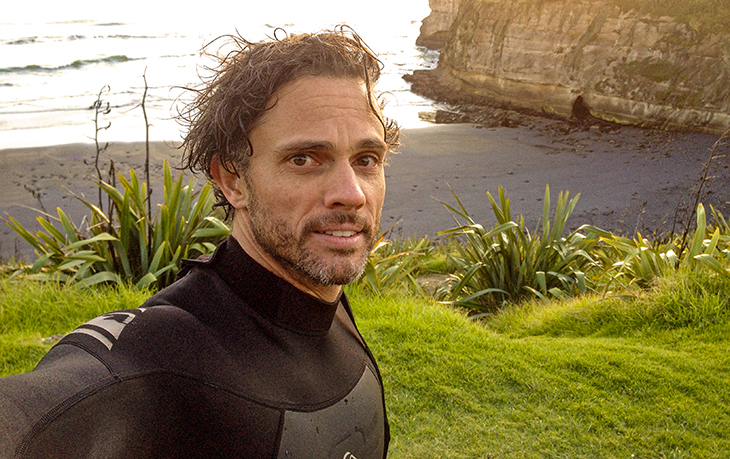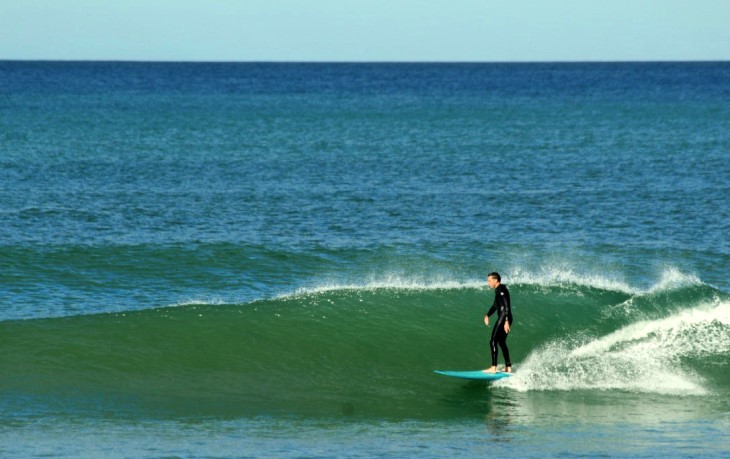Mick’s story: How a big wave knocked a surfer’s confidence

When a young surfie took his surfboard out to some big waves, he had a hunch he was paddling beyond his skill level - and he was right.
Mick Andrews is sitting on his surfboard out amongst the waves on Mangawhai Beach, Northland, as the sun rises over another set of golden waves.
He takes a moment to soak up the idyllic surrounds of his home beach and remembers a surf that could have changed his life.
Mick suffered a nasty head injury 22 years ago. He knows how lucky he is to still be able to do what he loves.
"These days surfing for me is an escape," says the 40-year-old.
"To be out in the water and in that beautiful scenery is pretty special. Maybe it's a sign of maturity but it's good to just appreciate the act of doing it rather than just going out there to ride big waves or push myself."
Mick is more cautious these days because he knows first-hand the impact of a surfing injury.
In 1999, he made his way to Ōakura in Taranaki for an Easter Surfing Camp.
He arrived a day early and went out for a surf with some mates at Stent Road.
He remembers the waves were about 1m to 1.5m high, and they were powerful.
"It was definitely on the bigger side of what I was comfortable with," he says.

Pummelled by a big wave
After catching a wave, Mick was paddling back out and a massive wave broke right in front of him.
He duck-dived – a surfing technique to dive underneath a wave with your surfboard - but might not have gone deep enough as the board got ripped out of his hands.
"I got totally pummelled," he says. "I remember my leg rope going really tight and then loose. The stretched leg rope helped bungy the board into Mick's face".
"A split second later, I got this almighty whack on my face. It was just like nothing I had ever felt before.
"It was like a car had driven straight into my face. It was incredible. I remember tumbling under the surface and thinking, 'Wow, that is going to have consequences'. Like, I can't believe I just felt that."
Dread and fear in the water
Mick floated to the surface. He was still conscious, and managed to find his board, but he couldn't see.
"I felt quite scared. I definitely had a sense of dread that something seriously bad had just happened."
Mick tried to paddle what he thought was in, but he was going further out to sea. His mate Paul Marshall noticed something was up and paddled over to him.
"Most people put on a brave face and say 'it's not too bad'. Well, he just looked at me and his face dropped. He looked like he had seen a ghost.
"I knew that I was in a bit of trouble and he realised that he was making me even more scared so he said, 'It's all good, bro. Shall we just paddle back in together?'"
Mick says it was a massive shock when he saw himself. His left eye was hideously swollen, he had a nasty gash on his cheek and there was blood coming out of his eye.
He was driven to Taranaki Hospital and spent a night there, as doctors wanted to monitor his symptoms in case the injury caused diplopia (permanent double vision).
Mick suffered a tear on his eyeball, and the face gash needed stitches. His face was badly bruised and several months after the incident he was still sore.
"I was pretty lucky I didn't lose my eye."
Injury still impacts 20 years later
ACC supported Mick's recovery with surgery and specialist care, but there were also long-term consequences from the injury.
"The board hit me in the front of my mouth with a mighty force. That led to me getting abscesses in my two front teeth, which caused those teeth to die and I had to have them replaced."
The impact from the board ripped his tear duct - which drains tears from the eyes to the nose. Mick had an operation to fix the tear duct where a stent was inserted to link the two again.
"It didn't work so to this day if I go into a cool breeze and my eye creates tears, the tears just run down the left-hand side of my face because they don't drain properly."
Push yourself – but not too far
Mick says he will never forget that afternoon at Stent Road. He offers good advice for other surfers.
"I'd say it's good to surf at the edge of your ability but not beyond it," he says.
"It's a healthy thing to push yourself a bit and ride waves that make you a little bit nervous. But you need to make sure you aren't going out in conditions that are beyond your ability, because it's easy to get in trouble."
And he says, on a practical level, whenever you're duck-diving waves, make sure you hold on tight to your board.
"Ever since my injured happened if I am getting tossed about in the water, I make sure I put my arms in a crisscross across my face. It can happen really quickly, and you can do some serious damage. You need to protect yourself."
Have a hmmm
In the past five years ACC has accepted 27,350 surfing-related injury claims, at a cost of $38m. ACC Head of Injury Prevention Isaac Carlson says it's estimated 90% of injuries aren't random, unconnected or unpredictable – they are predictable and therefore preventable.
"People can avoid most injuries by taking a moment to think – have a hmmm", says Isaac.
"It's all about taking a moment to think about what you're about to do, what could go wrong and taking action to make sure it turns out well.
"We want New Zealanders to enjoy their lives and have fun with their whānau and friends and we want to put the wero (challenge) out there. We can all prevent most harm happening in the first place."
Staying Safe in the Waves
Surfing New Zealand is encouraging New Zealanders to give the sport a go. But they need to make sure they surf at their skill level.
“As surfers we have to respect the ocean and acknowledge that our sport is an extreme sport and does have its dangers,” says Lee Ryan, the Development Manager at Surfing New Zealand.
“It’s just knowing how to minimise the risks and that comes with experience.”
Advice from Surfing NZ
- Surf within your skill level – if in doubt, don’t paddle out
- Use the correct surfboard for your ability and the conditions
- Make sure you keep your equipment in good condition – any open dings can cause injury. Check your leash for cuts and check the leash string where it goes into your deck plug to make sure it is not worn.
- Never ditch your board – your board is a floatation device and it will bring you back to the surface.
- If you are a novice get a lesson from a Surfing New Zealand approved surf school or qualified surf coach – it’s the fastest and safest way to improve your surfing. A list of Approved Surf Schools can be found here




